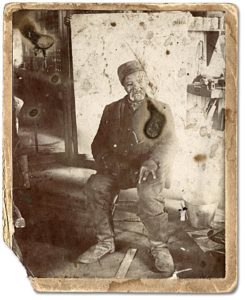 Right: Levi Veney, ex-slave who lived in Amherstburg, taken at J. D. Burkes’ store, 1898. Archives of Ontario. Click for large view.
Right: Levi Veney, ex-slave who lived in Amherstburg, taken at J. D. Burkes’ store, 1898. Archives of Ontario. Click for large view.
I am not one of those anti-MSM, “the boogiemen are just round that corner now that Democrats are here” sorts of persons that have been so tediously active in the blogosphere in the last 24 hours…but when I heard a self-congratulatory reference in a CBC radio piece suggesting Canada not having a history of race issues as had the USA, it did grate on the ears. Reminded me to switch stations. But it got me thinking…there must have been a last slave in Canada. We traded in human souls with the best of them before a certain date, before the long path to today began. Google Books to the rescue with the 1869 book History of the Settlement of Upper Canada (Ontario), with Special Reference to the Bay of Quinté by Wm. Canniff. where we read at page 574:
…when the British Act of Emancipation was passed, in 1833, setting free the slaves in all parts of the Empire, there was no slaves in Canada, Upper or Lower. Thirty years previous had the evil been crushed in Lower Canada, and forty years before Upper Canada had declared that it was “highly expedient to abolish slavery,” and had enacted laws to secure its abolition…
The story goes on to mention the slaves of of the first Loyalist familes who settled along the eastern shore of Lake Ontario and down the St. Lawrence and, at pages 576 and 577 there is this extraordinary statement:
We have before us the copy of an assignment made in 1824 by Eli Keeler, of Haldimand, Neweastle, to William Bell, of Thurlow, of a Mulatto boy, Tom, in which it is set forth, that the said boy has time unexpired to serve as the child of a female slave, namely, ten years, from the 29th Feb. 1824, according to the laws of the Province ; for the sum of $75. Probably, this was the last slave in Canada whose service closed, 1835.
It appears from that reference and a few others that a child of a slave was a slave until majority during the transitional period. So who was the last one alive? Probably not this gentleman, given Mr. Veney above, but he is worth mentioning now as Canniff did at page 577:
In the Ottawa Citizen of 1867, appeared the following: A BRITISH SLAVE — An old negro appeared at the Court of Assize yesterday, in a case of Morris vs. Hennerson. He is 101 years of age, and was formerly a slave in Upper Canada, before the abolition of slavery in the British possessions. He fought through the American war in 1812, on the side of the British; was at the battles of Chippewa and Lundy’s Lane, and was wounded at Sacket’s Harbour. He is in full possession of all his faculties. He was born in New York State in 1766, and was the slave of a TJ. B. Loyalist, who brought him to Canada. He was brought to this city to prove the death of a person in 1803, and another in 1804.
If he was wounded at the 1812 Battle of Sackets Harbor (there was another in 1813) that means he was at least in Kingston then as the British force was based here, a generation before the Martellos were built. I will have to see if that case is reported, if it actually gives his name.

[Original comments…]
TRex – November 6, 2008 7:21 AM
http://treacheroustruths.blogspot.com/
Good post. My Russian wife asked me just last week during the run-up to the US election if Canada had any history of slavery and I too quickly replied in the negative. Other than that I’ve tried to be even handed as regards answering questions about race relations in Canada but it’s hard to explain to foreigners without their eyes glazing over. Especially to a Russian Jew and my Japanese friends.
Ben (The Tiger) – November 6, 2008 8:26 AM
http://tigerinexile.wordpress.com
Our history — for good and for ill — is inextricably intertwined with the Brits. Their bad is our bad, and their good is our good. (Well, except that we got on the path to banning slavery 14 years before they did, and 40 years before it was banned in the Empire.)
Ben (The Tiger) – November 6, 2008 8:27 AM
http://tigerinexile.wordpress.com
Not majority — four years after the age of majority — 25.
Alan – November 6, 2008 8:49 AM
I agree we were tied to the UK but I think we may be able to say that there were far earlier pressures in Canada to push the Empire as opposed to being shackled to it. Joe Howe, the greatest Canadian, teaches us that. Through the vintage base ball research I see a huge swing to pro-US locally from 1837 when the militia was called out for fear of an invasion to 1870s when we were literally partying with them in the streets. Upper Canadian’s shift from first generation slave owners of the 1780s to their apparent rapid rejection of the practice within a decade is quite interesting. I wonder what happened in the rest of Canada?
Hans – November 6, 2008 9:26 AM
http://www.nissologypei.blogspot.com
Even with an early abolishment of slavery, the number of african-americans coming to British North America with British Loyalists meant that issues of racism persisted in Canada. Al, you’d be familiar with some descendents of these folks in Annapolis Valley, Truro, Cole Harbour and the Halifax Dartmouth area. Even in PEI, there was a tiny history of slaves, ex-slaves and their descendents and the issues they dealt with. The chief source is a book called “Black Islanders” by Jim Hornby.
Alan – November 6, 2008 9:59 AM
I remember a piece on CBC PEI about a decade ago on the African-Canadian experience on PEI and how most/all families after WWII basically moved to Halifax or elsewhere to join larger communities.
sean – November 6, 2008 10:04 AM
There was for many years in Canada, unofficial slavery as well, indebted servitude. Families who worked as slaves to pay off sponsors who aided them financially in getting to Canada.
My family home in which I grew up was an mid 1800s era structure. In the upper floor of the main residence portion, was a small apartment with washroom facilities that my father occupied from the 1940s onward. It was the “old servants quarters” and had a large wooden door that had a large deadbolt lock, on the outside. People who lived there and worked in the home were not officially slaves, but they couldn’t leave of their own free will in the evenings.
Alan – November 6, 2008 10:10 AM
Hey – that is another post.
sean – November 6, 2008 10:40 AM
My bad. Proper term is: Indentured Servitude.
TRex – November 6, 2008 11:32 AM
http://treacheroustruths.blogspot.com/
Hans: *Annapolis Valley, Truro, Cole Harbour and the Halifax Dartmouth area* heh, I used to live in all those places when I was graduating from high school and entering DRVS so as to stay out of trouble. If I knew then what I know now…
Hans – November 6, 2008 12:00 PM
http://www.nissologypei.blogspot.com
TRex: If only….
Al: Not all.
Alan – November 6, 2008 2:25 PM
TRex: I am a CEC-er. You?
Josh – November 6, 2008 4:52 PM
http://winteringwaterloo.blogspot.com
I wouldn’t be that sanguine about race relations in NS, at least in some rural areas like the Valley (or, for that matter, the Mountain). There were segregated schools here until the 50s at least, and the name Africville ought to ring a bell for most junior high school students.
Alan – November 6, 2008 4:55 PM
Into the 60’s in Truro as I recall, though I moved there in the latter 70’s. You make something of an excellent extension of the point I was making way up top when the CBC-voice told me that all was so nice in Canada and so bad in the US.
Alan – January 9, 2009 4:30 PM
More here and here.